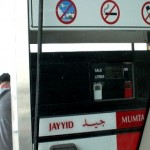The big news from the oil world in the past fortnight was the ‘deregulation’ of gasoline/petrol and diesel prices in the United Arab Emirates (UAE), resulting in an increase by 24% in the price of petrol to $0.58 per litre, still very low by global standards. This hike comes at a time when global petroleum prices have fallen and reveals the extent to which fuel in the UAE was being subsidized and the pain from low oil price has now forced the UAE government to cut down on subsidies.
Meanwhile, fuel at $0.31 a litre is cheaper in neighboring Oman, giving rise to a new business – the smuggling of petrol. News reports indicate that fuel stations at the UAE-Oman border are doing brisk business, and new stations have sprouted in recent weeks – a concern for Omani authorities. The smuggling is hurting Oman, which has a current fiscal deficit of 14.8% of GDP. Petrol prices of other Gulf Cooperation Council(GCC) members Saudi Arabia, Kuwait, Bahrain and Qatar are even cheaper, ranging from $0.16 to 0.28 per litre.
The troubles of Oman and the UAE indicate that the six-member GCC – an oil rich cohort with low populations – is also starting to feel the pinch of low oil prices. These countries need oil to be between $65 and $108 per barrel to keep their budgets balanced. The IMF used $57 per barrel as the base price of oil, to project fiscal deficits for five of the GCC members–the current price of crude oil is less than $50 per barrel. Adding to their gloom is the repeal of sanctions on Iran, which means more oil will be pumped into world markets, keeping prices lower for longer.
| Table 1: Fiscal Balance & Breakeven oil price for GCC Countries | ||
| 2015 Fiscal Balance (% of GDP) | Fiscal Breakeven oil price ($/barrel) | |
| Saudi Arabia | –20 | 87.2 |
| Kuwait | 11 | 75 |
| UAE | –2.3 | 73.8 |
| Qatar | -1.5 | 64.1 |
| Oman | –14.8 | 108 |
| Bahrain | -12.1 | 99.8 |
| Source: IMF | ||
| Figures for Kuwait, Qatar & Bahrain(Jan 2015)Updated estimates for KSA, UAE & Oman | ||
The stress on budgets comes at a bad time.
Following Iran’s nuclear deal with the P5+1, the GCC nations are expected to purchase more defense equipment. Just days after the deal was announced, Saudi Arabia placed an order for 600 Patriot missiles, valued at $5.4 billion, from the U.S. Saudi Arabia was the world’s top arms importer in 2014. It is currently leading a war against an Iranian backed faction in Yemen, with the backing of all other GCC members, with the exception of Oman. In fact, Saudi Arabia, Qatar and UAE, the three biggest GCC oil producers, have not lowered defense spending in 2015 despite the dramatic, over 50% fall in oil prices.
Adding to their external concerns are internal ones – unrest within their own populations, simmering since the so-called ‘Arab Spring.’ These countries relied on higher social spending to quieten political unrest. This cannot continue indefinitely, but if let up, can lead to another set of problems for some of the states.
What then, is the economic stress point for India? The GCC accounts for just over 16% of India’s exports, including discretionary items such as gems and jewelry. Weak GCC economies can hurt Indian exporters and spell trouble for Indian banks especially those which lend to the gem and jewelry sector. Already in 2013, Winsome Diamonds, a jewelry exporter, defaulted on its loans of Rs 6,000 crore to a group of banks.
About 3.3 million expatriate Indians also work in the six GCC nations. During the 2008 economic crisis, activities such as construction came to a halt in Dubai, rendering thousands of Indian workers jobless.
The drop in oil prices has so far benefited India, but any political change could destabilize current equations. India can insulate its economy by diversifying energy supply sources, and by buying stakes in global oil and gas fields, to guard against the unforeseen.
Amit Bhandari is Fellow, Energy & Environment Studies, Gateway House.
This blog was exclusively written for Gateway House: Indian Council on Global Relations. You can read more exclusive content here.
For interview requests with the author, or for permission to republish, please contact outreach@gatewayhouse.
© Copyright 2015 Gateway House: Indian Council on Global Relations. All rights reserved. Any unauthorized copying or reproduction is strictly prohibited.


